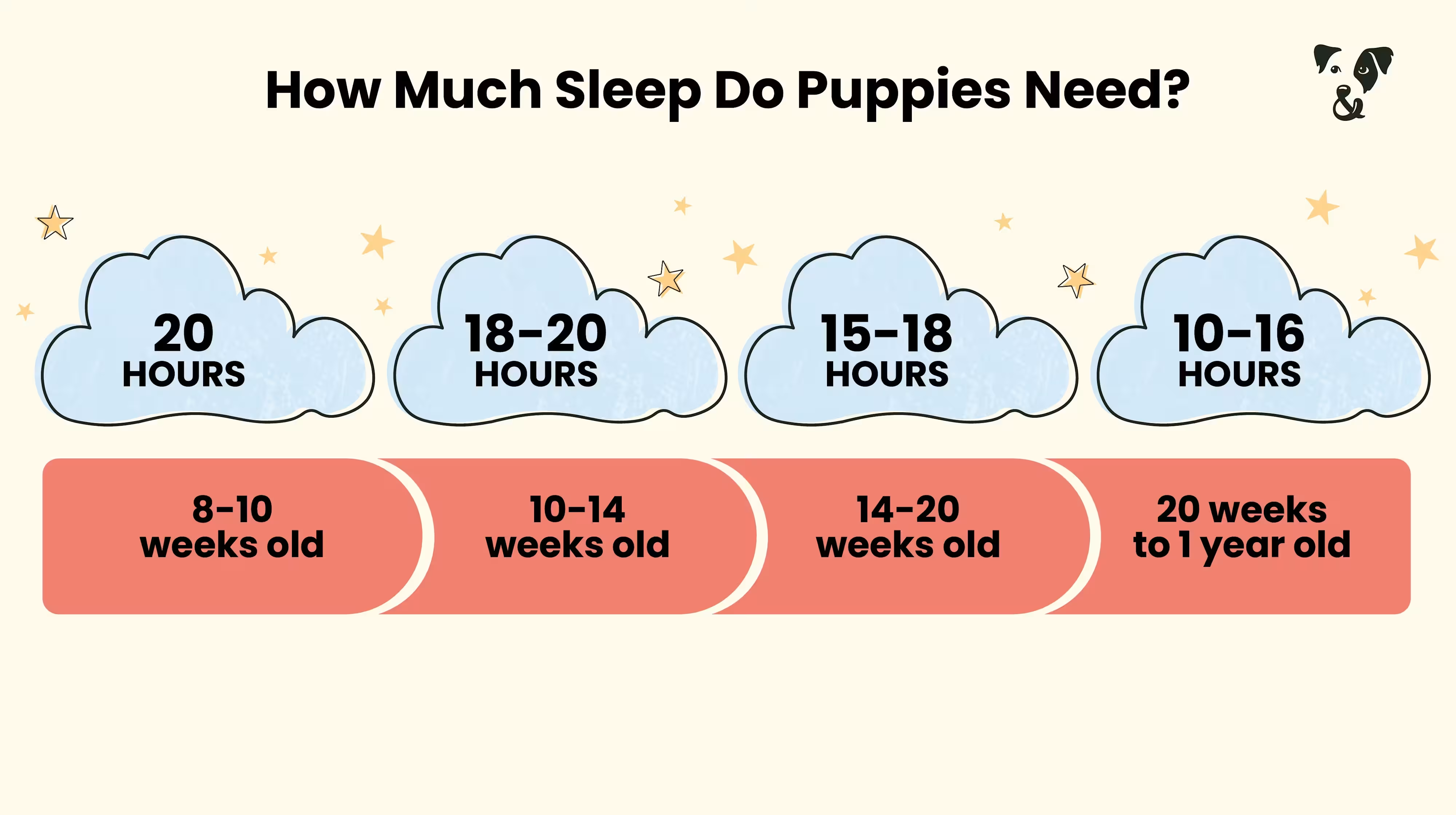With exploring, playing, socialising and causing mischief taking up so much energy, a big part of your puppy’s everyday routine should be sleeping and napping.
But getting your rambunctious pup to settle, or even sleep during the night (when you’re also trying to get your forty winks) is easier said than done. Well, we pooch experts are here to help! Explore our article to find out why sleep’s so important to puppies and how you can keep on top of their snoozes with the perfect puppy sleep schedule.
Why is sleep so important for a puppy?
Sleep helps a puppy’s brain decompress and register everything they’ve learnt throughout the day. It helps with their memory and of course, gives them a bit of well-deserved rest after an hour of running circles around you. So, if you want any of your training to stick, a good kip is what your pup needs!
How much sleep do puppies need by age?
With so much learning, exploring, training and playing to be done - puppies need a lot of time to recharge. The average puppy will sleep up to 20 hours a day, but this will change as they grow.
8-10 weeks old - 20 hours
10-14 weeks - 18 - 20 hours
14-20 weeks - 15-18 hours
20 weeks to 1 year - 10-16 hours
To read more about how much sleep your pup should get, explore our article, ‘ How much sleep do puppies need? ’
How much do puppies nap?
With so much of a young puppy’s life taken up by sleep, it’s no surprise that most of the day you’ll find them napping. Overall, only 5-6 hours of your puppy’s day consists of being awake, and this is often spread out between 5 or 6 naps.

How to train my puppy to sleep through the night
Sleep training is one of the main focuses of puppy training and requires a lot of work, time, patience, and a whole lotta love. Like most puppy training, sleep training requires a slow and gradual approach to make sure that it’s an all-around positive experience.
Once you’ve decided where your puppy will sleep, whether it’s a crate, a basket or a playpen, you need to make sure they see that space as somewhere positive. This requires a lot of
Positive reinforcement with treats and love.
Practicing during the day.
Avoiding using it as a time-out zone when they’re being naughty.
Making it a comfy and cosy space.
Once they have a designated sleeping area, consider the following to help them sleep throughout the night:
Have dedicated wind-down time before bed so they know when to relax.
Use a soothing tone when speaking to your pup before bed.
Put away all toys and other distractions before bedtime.
Fill the day with as much play, mental stimulation and enrichment as possible.
Don’t fuss over them too much when they wake up and whine during the night.
Use the time they do wake up to take them for a toilet break.
Puppies whining at night is often down to separation anxiety. This anxiety stems from the fear and stress they experience when left alone and away from you. For more information about separation anxiety and tips to help curb its symptoms, be sure to explore our guide: ‘ Tips for Avoiding Separation Anxiety in your puppy ’.
How to get your puppy to sleep in a crate
Crates are one of the most commonly used sleeping quarters for a pup. The lockable door not only gives them a cosy and secure place but can also keep them safe when left alone. However, getting them to happily sleep in one is no ‘walkies’ in the park.
Like many other areas of puppy training, getting your pup to sleep in a crate is all about controlled exposure and positive reinforcement.
You need to make the crate a relaxing, calm and safe space where only good things happen. This can be done via gradual exposure, treats and a soft and gentle approach - especially at bedtime.
Treats
Delicious treats that taste good & do good too – perfect for dogs of all ages. Looking for something puppy-friendly? Check out our puppy treats collection.
-

 from
fromCurrent price: £3.99
Calming Probiotic Meaty Treats -

 from
fromCurrent price: £3.99
Health & Digestion Probiotic Fish Treats -

 from
fromCurrent price: £11.49
Dental Stick Bundle For Dogs -

 from
fromCurrent price: £10.49
Meaty Treats Taster Pack -

 from
fromCurrent price: £3.99
Calming Dental Sticks For Dogs -

 from
fromCurrent price: £3.99
Peanut Butter Dental Sticks For Dogs -

 from
fromCurrent price: £4.99
Long-Lasting Fish Hide Chews -

 from
fromCurrent price: £4.99
Calming Fish Hide Chews -

 from
fromCurrent price: £8.49
High Protein Beef Jerky -

 from
fromCurrent price: £9.50
Fish Chews Bundle -

 from
fromCurrent price: £3.99
Spirulina & Mint Dental Sticks For Dogs -

 from
fromCurrent price: £3.99
Cheddar Cheese Dental Sticks For Dogs -

 from
fromCurrent price: £3.99
Skin & Coat Probiotic Meaty Treats -

 from
fromCurrent price: £3.99
Dental Probiotic Meaty Treats -

 from
fromCurrent price: £3.99
Peanut Butter Probiotic Nutty Treats -

 from
fromCurrent price: £3.99
Cheddar Cheese Probiotic Treats -

 from
fromCurrent price: £7.50
Peanut Butter Bundle -

 from
fromCurrent price: £7.50
Cheddar Cheese Bundle
For the perfect, high-reward treat specifically designed for puppies, try our Pooch & Mutt Puppy Jerky ! Packed with nutritious, puppy-safe ingredients like beef, cranberry and rosemary, they’re small in shape but mighty in taste and can help make puppy training that little bit easier.
For older puppies 12 weeks and up, you can treat them to our range of Meaty Treats . Consisting of Calming Probiotic Meaty Treats that can help soothe excitable pups, Dental Probiotic Meaty Treats for healthy teeth and Skin and Coat Probiotic Meaty Treats for shiny, glossy fur - you can reward good behaviour and contribute to a functional, healthy diet.
Needing a meat-free alternative for sensitive tummies? Try our Health and Digestion Probiotic Fish Treats ! Using a salmon base, these little fishies are packed with protein and are easy on sensitive bellies. For a completely vegan alternative, try our Peanut Butter Probiotic Nutty Treats for an utterly nutterly flavour.
If you’re looking to start crate training with your pup, explore our full guide: ‘ How to crate train your puppy ’.
When is a puppy’s bedtime?
It’s best to make a puppy’s bedtime the same time as yours so it’s easier to stick to a solid routine and you can avoid disturbing them.
That said, it’s advised that pups should go to bed around 1 hour after their last meal of the day, and right after going to pee and poop.
Not only does this allow their meal to settle, but it also starts off the habit of having a toilet break before bedtime. This will come in useful when they’re old enough to hold their bladder throughout the night.
Puppy Sleep Schedule
Making sure your pup settles for a full night’s sleep can be made a little easier by following a good routine. Considering everything we’ve covered, here’s a routine you can use as the foundation for moulding your pup’s sleeping habits.

Stimulating Activity - You know the saying by now - a tired dog is a good dog! For a puppy, playing and taking part in mentally enriching activities is just as important as sleep.
Filling your puppy’s day with playtime, enrichment toys and training will tucker them out both mentally and physically, helping to promote a good night’s sleep later on.
Last meal of the day - Between the ages of 8 weeks and 6 months, puppies should be fed around 2-4 times a day, with a portion size that equates to their size and breed.
Their fourth and final meal should be fed over an hour before they go to bed, so they have ample time to digest it.
If you’re wondering how much you should be feeding your puppy, explore our Puppy Feeding Guide.
Toilet Break - For puppies, mealtime will most likely be followed by a need to pee or poop.
To get them in the habit of going after their last mealtime AND before bed, use this time to take them to their designated toilet area.
You may find that by the time they’re an adult dog, they’ll be telling YOU it’s toilet time!
However, for young puppies, this certainly won’t be the last toilet break of the night.
For puppies nearer to 8 weeks, you can expect to be getting up every hour.
Wind down - Now you have a satisfied, tuckered-out pup, it’s time to take it down a notch. Before bed, teach them that this is now wind down time.
Tidy toys away, lower your tone and curl up on the couch for some cuddles. This will prepare them for the next few hours, and teach them that at night - we like to sleep!
You may find that in the middle of the night, they’re suddenly full of beans. But this is just typical of erratic puppy energy levels.
Keep up the low tones and the relaxed manner to let them know it’s still time for sleep. Maybe try them for a toilet break, but maintain a calming approach until they drift back off to sleep.
Sleep training - Once you’ve settled your puppy in their sleep quarters, the training can commence…
Whilst your puppy’s still learning, to them, nighttime is just extended playtime! Keeping to routine and your relaxed, dulcet tones will eventually teach them that when you’re in bed, they should be too.
Try not to pander to their whines too much, but also don’t leave them to cry it out. This has been known to stress out a pup further so. If their crying doesn’t subside after 5-10 minutes, tend to them quietly, trying not to excite them. Try them for the toilet and remain with them at a distance until they settle again.
For further tips for surviving the night with your puppy, explore our expert guide, ‘The first night with your new puppy’.
Raising a pup is certainly hard work! But with lots of love, patience and a solid, easy-to-follow routine, it’s much easier to handle. Before you know it, they’ll be all grown up and settled into their new life with you.
For that extra support and advice, be sure to explore our entire Puppy Blog - packed with tips, advice, know-how and expert trainer how-tos, so you can kick off your pup’s life with their best paw forward.


Puppy Beef Jerky Training Treat
Our grain free puppy jerky is the perfect high-value training treat, for pups learning the ropes. Made with 90% Fresh Beef, it helps retain focus and reward good behaviour.
-
High-value training treat
-
Puppy-friendly
-
90% Fresh Beef
Current price: £3.99
Puppy Beef Jerky Training Treat




